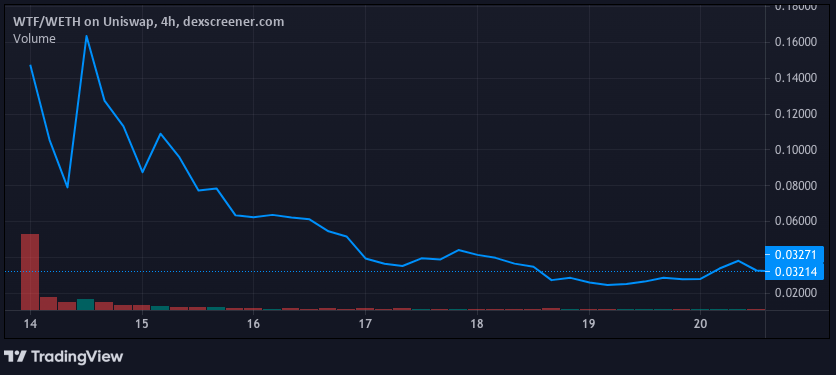Crypto airdrop tries to cover everyone’s Ethereum gas fees, fails miserably

A crypto airdrop marketed to Ethereum users botched everything imaginable last week, with widespread complaints of bunk tokenomics and terrible liquidity.
The ironically-named WTF airdrop promised to help to defray the cost of Ethereum users’ historical gas fees. WTF was initiated by the folks behind fee-tracking portal fees.wtf.
The site subtly skewered the absurdity of Ethereum’s often-costly transactions by allowing users to see how much they’d spent to transact on the network.
Any Ethereum user who’d spent more than 0.5 ETH ($1,559) in gas by the January 1, 2022 snapshot could claim a minimum of 30 WTF tokens. They could then sell to spiritually reclaim fees they’d spent until that point.
To receive the airdrop, WTF asked gas spenders to:
- connect their wallets to its website,
- pay a special fee on top of Ethereum gas fees to claim WTF tokens and an NFT,
- execute smart contracts to “enable” trading for two tokens on decentralized exchange Uniswap (more gas),
- and finally, execute a costly Ethereum transaction (plus slippage) to swap the claimed WTF tokens into Ether or some other safer asset.
Indeed, to claim the WTF tokens, participants had to transfer $40 worth of Ether as a mandatory courtesy to the project.
Yet even typical reward amounts of 100 to 200 WTF tokens failed to cover the gas required to claim and sell on Uniswap.
At best, those tokens were worth between $16 and $32 at their brief price peak.
Now, WTF tokens trade for just $0.03 apiece — valuing the airdrop between $3 and $6, down more than 80% since topping out on Uniswap.
‘It seems right that we get paid for this’
WTF also charged a 4% fee for subsequent token transactions, which would generate revenue for token holders moving forward.
According to the team, project members don’t have a stake in the token, so the 4% Fee on Transfer (FoT) tax won’t benefit any insiders.
As for the $40 fee to claim WTF tokens, in a post-mortem the team said up to half of those paid for those who initiated referral links, in which case the site would’ve received between 0.005 ETH and 0.009 ETH ($16.2 to $29.23) per unlock split between four team members.
Etherscan shows roughly 21,000 addresses hold some amount of WTF tokens. In total, reported figures indicated the team raked in over 147 ETH ($460,000) via its unlock fee, and 7.8 million WTF ($235,000) tokens from transaction fees as of last week.
“We worked hard creating fees.wtf, and will continue to work hard supporting it. Call us crazy but it seems right that we get paid for this,” said the group. “We didn’t take a team share of tokens for this reason.”
Liquidity snafu meant bots ruled the market
While 7.8 million WTF were technically valued at anywhere from $1.2 million to $2.4 million at its peak, the token’s backers failed to deposit enough liquidity on Uniswap for trading.
This meant a small set of buyers and bots could spike the price with ease. But with nobody buying, the price collapsed within seconds.
In fact, the five minutes after Uniswap opened trading saw token prices skyrocket and then collapse by 99% numerous times, faster and more violently than classic pump-and-dump schemes.
But one trader who reportedly bought tokens for 10 ETH ($32,000) and sold the same batch for 87 ETH ($263,000) is believed to have wrecked the entire market, at least for the time being.
The project has reasoned that WTF’s stupidly volatile price was the likely result of trading bots swapping tokens amongst themselves, reducing the likelihood that innocent investors were hurt.
“Based on what we can tell, few if any real users were affected during this battle that took place within the first couple of blocks,” said the collective of anonymous devs.
“However, due to the price shooting up, it did set a very unrealistic price precedent, which obviously was unsustainable and therefore led to a dramatic price drop once more liquidity was added and the market was free to trade.”

WTF airdrop was not a rugpull, says team
At best, WTF bungled its airdrop.
But at worst, WTF conducted a scam by promising an airdrop that did nothing but cost its claimers more money than they had paid in gas fees. In any case, its insiders laughed all the way to the bank.
For what it’s worth, the WTF team has addressed whether it would change anything if given another shot.
“This is a really tough question. From our perspective we have delivered exactly what we were offering. At no point were we maliciously hiding any information or trying to misinform our users, but some events have transpired that have generated hate and mistrust,” it said.
Fees.wtf reckoned it would’ve been difficult to secure an outcome in which WTF’s price didn’t totally collapse on the first day, particularly due to trading bots and speculators.
Read more: [DAO leader causes cascade across ‘rebase’ tokens after $11M dump]
“People angry at us for the events that transpired don’t fully grasp what happened, and those calling the airdrop a rug need to re-evaluate what a rug actually is,” said the group, our emphasis.
“The fees.wtf team are all still here. We’re still working, and will continue to work on fees.wtf to deliver exactly what was promised. The first 24 hours have been rough, but we’re going to build from this.”
Looking for bite-sized news? We’re on Twitter.
